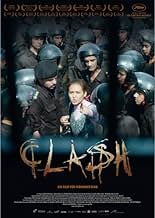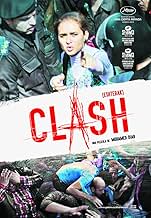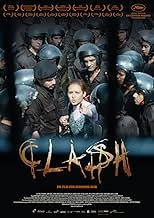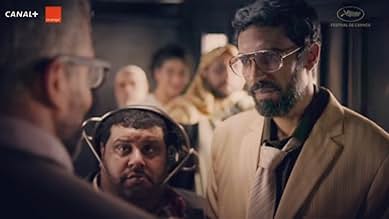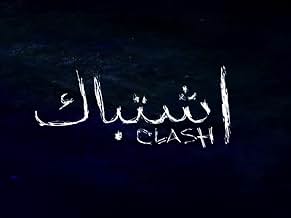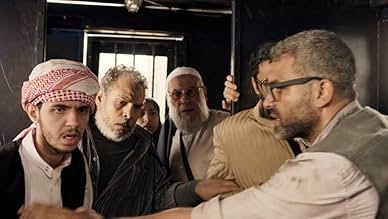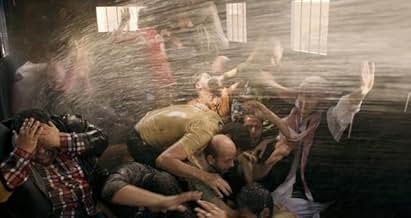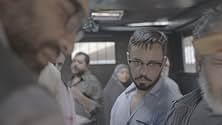AVALIAÇÃO DA IMDb
7,4/10
6,4 mil
SUA AVALIAÇÃO
Adicionar um enredo no seu idiomaSet entirely in an 8m police truck, a number of detainees from different political and social backgrounds are brought together by fate, during the turmoil that followed the ousting of former... Ler tudoSet entirely in an 8m police truck, a number of detainees from different political and social backgrounds are brought together by fate, during the turmoil that followed the ousting of former president Morsi from power.Set entirely in an 8m police truck, a number of detainees from different political and social backgrounds are brought together by fate, during the turmoil that followed the ousting of former president Morsi from power.
- Prêmios
- 13 vitórias e 9 indicações no total
Muhammad El-Sebai
- Zain
- (as Mohamed El Sebaey)
Mohamed Elsewisy
- Uwais
- (as Mohamed El Souisy)
Ahmad Abdulhamid Hifni
- Awadh
- (as Ahmed Abdel Hamid)
Husni Sheta
- Fishoo
- (as Hosny Sheta)
Dash Ahmed
- Fares
- (as Ahmad Dash)
Gamil Barsoom
- Salah
- (as Gameel Barsoum)
Muhammad Tareq
- Hussein
- (as Mohamed Tarek)
Muhammad Gamal Qalbaz
- Tamer
- (as Mohamed Gamal Kalbaz)
- Direção
- Roteiristas
- Elenco e equipe completos
- Produção, bilheteria e muito mais no IMDbPro
Avaliações em destaque
The idea of a film set entirely within a police truck in Cairo does not seem a particularly enticing prospect. Writer, director Mohamed Diab manages, however, to make this both riveting and exciting. With the considerable mix of Egyptians packed together and the troubles raging on the streets outside, this is an incredibly potent mix of actions, emotions and life changing moments. Clearly, the van load of Muslim Brotherhood supporters, Christians, police and their supporters brings all into conflict but also provides the opportunity to consider compromise and the possibility of swapping conflict for reconciliation. At the same time this is a thunderingly exciting film with provocative and believable dialogue and wincingly, in your face action. Interrupted momentarily whilst watching, I returned to my seat to become aware of just how fast my heart was racing. Stunning filmmaking and easily enjoyed without considering the political dimensions but even more potent in doing so.
The movie opens with a few lines recounting the events that led to the heated rivalry between the Army (& pro-army supporters) and the Muslim Brotherhood (henceforth 'MB'); the camera having set its gaze inside an army truck.
A couple of journalists (who claim to be neutral to both factions) are arrested and brought into the truck. Their attempts at drawing an Anti-MB mob's attention to assist in their escape backfire when the senior reporter is observed to capture the incident on a watch that doubles as a camera. The army is forced to apprehend the mob for pelting stones and lock them inside the truck.
One thing leads to another and before we know it, a bunch of MB supporters are taken into custody and put along with the rest of the detainees in the truck. The situation outside is tense in itself, but imagine supporters of two rickety factions being forced to share a claustrophobic space together. The numbers comprise people not just with different political ideals, but of varied age-groups, religions and genders.
The writing is sensationally solid with lines given to members from both divisions to substantiate their character arcs. But circumstances are such that, eventually, all of them start to wilt and run out of hope (and breath) while stuck inside the van, left undeniably helpless when it comes to saving their own butts before their loved ones'.
The crowd includes individuals who are friends, relatives, acquaintances and even colleagues. Although it might seem a little difficult to follow the names and faces of each of the characters, the writing/direction is sublime enough to collectively grasp the divided opinion. What's astonishing here is how the Diabs even manage to bring in some unexpected comic relief as well in the form of a brilliantly-written scene involving a wannabe actor/singer, that is just a fleeting moment of joy before terror strikes yet again.
Cinematography work (by Ahmed Gabr) is first-rate. Even though shooting within the confined setting of the film must have been strenuous, there are plenty of visuals (and scenes in totality) that stick with the viewer: the adolescent woman who struggles hard to hold nature's calls but seemingly gives in at one point, the aspiring DJ who has had enough of seeing everyone around him riot and settles into his own "happy zone" by listening to music from his phone, the soldier who disobeys orders while delineating his humanitarian side, the reversal of fate for another officer (the list is endless!).
The crafting of the riot scenes taking place outside is magnificently believable and terrifying to perceive. To add to the positives of the film, the climactic finale was indeed difficult to envisage. The tagline of the film says "Conflict is on the Inside" and it reinstates this through a powerful narrative which delves into both political and personal strife. The film rightfully deserves a bigger audience and greater appreciation than it has already been earning.
Verdict: Must-watch!
A couple of journalists (who claim to be neutral to both factions) are arrested and brought into the truck. Their attempts at drawing an Anti-MB mob's attention to assist in their escape backfire when the senior reporter is observed to capture the incident on a watch that doubles as a camera. The army is forced to apprehend the mob for pelting stones and lock them inside the truck.
One thing leads to another and before we know it, a bunch of MB supporters are taken into custody and put along with the rest of the detainees in the truck. The situation outside is tense in itself, but imagine supporters of two rickety factions being forced to share a claustrophobic space together. The numbers comprise people not just with different political ideals, but of varied age-groups, religions and genders.
The writing is sensationally solid with lines given to members from both divisions to substantiate their character arcs. But circumstances are such that, eventually, all of them start to wilt and run out of hope (and breath) while stuck inside the van, left undeniably helpless when it comes to saving their own butts before their loved ones'.
The crowd includes individuals who are friends, relatives, acquaintances and even colleagues. Although it might seem a little difficult to follow the names and faces of each of the characters, the writing/direction is sublime enough to collectively grasp the divided opinion. What's astonishing here is how the Diabs even manage to bring in some unexpected comic relief as well in the form of a brilliantly-written scene involving a wannabe actor/singer, that is just a fleeting moment of joy before terror strikes yet again.
Cinematography work (by Ahmed Gabr) is first-rate. Even though shooting within the confined setting of the film must have been strenuous, there are plenty of visuals (and scenes in totality) that stick with the viewer: the adolescent woman who struggles hard to hold nature's calls but seemingly gives in at one point, the aspiring DJ who has had enough of seeing everyone around him riot and settles into his own "happy zone" by listening to music from his phone, the soldier who disobeys orders while delineating his humanitarian side, the reversal of fate for another officer (the list is endless!).
The crafting of the riot scenes taking place outside is magnificently believable and terrifying to perceive. To add to the positives of the film, the climactic finale was indeed difficult to envisage. The tagline of the film says "Conflict is on the Inside" and it reinstates this through a powerful narrative which delves into both political and personal strife. The film rightfully deserves a bigger audience and greater appreciation than it has already been earning.
Verdict: Must-watch!
Seen at the Filmfest Ghent 2016 (website: http://www.filmfestival.be/en). Prior to the screening, the director told that he succeeded in pissing off everyone in Egypt by making this movie. Arousing that much controversy can be considered a huge success in itself, were it not that he suffered some trauma because of everyone punching him afterwards. Along the line, he was accused of being a spy, funded by the West, even though the film is against no one, just pro humanity in general. Even so remarkable is that the film got attacked by everyone equally, because it inadvertently seemed to humanize "the others".
After Lebanon (2009, Samuel Maoz) this movie extends the concept of the narrow space with a very limited view on the outside world, and no easy way to escape due to a hostile environment. New is that the 25 persons locked up in a police van, are very different from each other with respect to age, religion, politics, and even sexes are mixed with all complications thereof. In other words, the hostility is not only the outside world but comes from fellow prisoners too, maybe even more so from internal rather than external.
For me it was not easy to remember faces and names; I lost track of each one's political stance very soon. Nevertheless, the hodgepodge of people and attitudes is clear from the outset. There is spurious contact with other police vans, containing people in a similar position, with name exchanges to verify whether relatives or friends are kept there and hopefully are in good health. Also, there are frequent contacts with soldiers, sometimes helpful sometimes not so helpful due to orders from higher echelons, or flatly unhelpful because of uncertainty about the other side's intentions.
The Q&A with the director after the screening brought a lot of useful information, in fact an addendum to his initial address before the screening. I scribbled down the following notes. It is difficult to make a movie like this in contemporary Egypt. A self-contained movie could be made about the making of this one, or even around making movies in general in Egypt for that matter. And it can still be worse, when seeing the film being pulled off cinema listings after its official release. On the other hand, he received moral support from outside Egypt, like for example Tom Hanks, who wrote that this movie changed his view on Egypt. Following up on a question from the audience, about being still welcome in Egypt, the director replied that it is complicated. In any case, it is still unclear whether he could make any other film there. It is not that that some person or some bureaucracy is against, because of Egypt being so many things together and certainly no homogeneous mass. Another question from the audience about the humor that was prominently present, despite the subject matter being a very serious matter. The director replied that the humor was interwoven to breathe, something that is very common in Egypt, often observed even during funerals.
After Lebanon (2009, Samuel Maoz) this movie extends the concept of the narrow space with a very limited view on the outside world, and no easy way to escape due to a hostile environment. New is that the 25 persons locked up in a police van, are very different from each other with respect to age, religion, politics, and even sexes are mixed with all complications thereof. In other words, the hostility is not only the outside world but comes from fellow prisoners too, maybe even more so from internal rather than external.
For me it was not easy to remember faces and names; I lost track of each one's political stance very soon. Nevertheless, the hodgepodge of people and attitudes is clear from the outset. There is spurious contact with other police vans, containing people in a similar position, with name exchanges to verify whether relatives or friends are kept there and hopefully are in good health. Also, there are frequent contacts with soldiers, sometimes helpful sometimes not so helpful due to orders from higher echelons, or flatly unhelpful because of uncertainty about the other side's intentions.
The Q&A with the director after the screening brought a lot of useful information, in fact an addendum to his initial address before the screening. I scribbled down the following notes. It is difficult to make a movie like this in contemporary Egypt. A self-contained movie could be made about the making of this one, or even around making movies in general in Egypt for that matter. And it can still be worse, when seeing the film being pulled off cinema listings after its official release. On the other hand, he received moral support from outside Egypt, like for example Tom Hanks, who wrote that this movie changed his view on Egypt. Following up on a question from the audience, about being still welcome in Egypt, the director replied that it is complicated. In any case, it is still unclear whether he could make any other film there. It is not that that some person or some bureaucracy is against, because of Egypt being so many things together and certainly no homogeneous mass. Another question from the audience about the humor that was prominently present, despite the subject matter being a very serious matter. The director replied that the humor was interwoven to breathe, something that is very common in Egypt, often observed even during funerals.
After the screening in the London Film Festival, when the director and producer came on stage to speak with the audience (overwhelmingly from the Middle East), more than one person complained to them that the movie had too much humour in it while there was nothing amusing about Egypt's regime and the tragic events that came on the heels of its botched popular revolt. Clash is shot from within the interior of a police van. Inside a group of people - women and men, Islamists and secularists, young and old - are being moved around Cairo. They have all been arbitrarily and violently detained by the security forces during pro- and anti- regime demonstrations taking place on this day, and they are moved around simply because the prisons are already too full. The interactions among the people inside the van and their interactions with the security personnel and others outside it engulf the viewers with claustrophobia, anger, fear, horror, despair, and glimmers of hope that are quickly dispelled. And yes, as the Director explained, there are funny moments, simply because Egyptians are humorous. It is a bold and daring film, exposing all those who took part in it to the risks of the regime's displeasure. It has been approved for screening by the Egyptian censor, but not without some interventions that the director and producer preferred not to recall. All in all, a superb mirror of the suffocating air in present day Egypt.
There has been much anticipation and controversy preceding the theatrical release in Egypt with several rumors that it will get censored on not released at all and a reporter on National TV called the director a "traitor" and an "anarchist who only focuses on the bad aspects of Egyptian society to capitalize on them." But although it's the most political film to be released in Egypt after the revolution ,in a market dominated mostly by comedies and Hollywood blockbusters, it comes off as mostly apolitical.
Clash is the second feature film for writer/director Mohamed Diab taking place in early July 2013 after president Mohamed Morsi was overthrown by the army and many people took off to the streets either to celebrate or protest. Starting in an empty police car of about eight meters square which soon gets filled with different people arrested in the protests ranging from an American/Egyptian reporter to revolutionaries and Muslim Brotherhood supporters to a group of young men who had nothing to do with it all except that they happened to be walking by.
Tensions arise and we start to see the sheep mentality of both the Muslim Brotherhood members who only talk to each other and refuse to stand next to the others and that of the policemen who refuse to giver the arrested water as they were not "ordered" to.
But the movie doesn't focus on their political affiliations and portrays them as only humans. We see the revolutionary nurse helping a wounded M.B member. They sing, they share their memories during the Arab Spring revolution. The short running time may not allow to dig deeper into the characters but I believe it focuses on living the experience by confining our POV inside the car during the whole movie making us feel as hopeless and suffocated as those trapped who aren't even allowed to pee and instead are shown how to do it in a bottle.
The dialogue sometimes seems a little childish and some things felt like they were thrown in just to increase the running time as the argument between Mans and his friend who found out that Mans is sending romantic messages to the his sister.
The clash scenes between the police and the protesters were masterful and showing them only through the car windows makes them seem even more colossal giving a real feeling of the chaos. The ending was cinematically beautiful with the green lasers all over the place. Although the ending may seem a little unsatisfying to some (including me at first), I think it's the perfect reflection of the current thinking in Egypt.
After The Revolution in 2011 during the Arab Spring, everyone, especially the youth, started thinking of his own utopia and were looking forward to a "New Egypt" only to see their dreams evaporate as they saw the same mistakes being repeated again, their political leaders betraying them, giving them only false promises and sweet talk. As I am writing this now, the economy is at its lowest with the rich/poor gap widening gradually, the budget for health and education dwindling, the political arena is filled with the same faces or new faces with the same mindset of the old regime. Censorship touches everything and there have even been talks to censor the Social media. so you can't really blame them for losing hope and abandoning their dreams and not seeing the light at the end of the tunnel. For them there is only darkness-nothing else.
Clash is the second feature film for writer/director Mohamed Diab taking place in early July 2013 after president Mohamed Morsi was overthrown by the army and many people took off to the streets either to celebrate or protest. Starting in an empty police car of about eight meters square which soon gets filled with different people arrested in the protests ranging from an American/Egyptian reporter to revolutionaries and Muslim Brotherhood supporters to a group of young men who had nothing to do with it all except that they happened to be walking by.
Tensions arise and we start to see the sheep mentality of both the Muslim Brotherhood members who only talk to each other and refuse to stand next to the others and that of the policemen who refuse to giver the arrested water as they were not "ordered" to.
But the movie doesn't focus on their political affiliations and portrays them as only humans. We see the revolutionary nurse helping a wounded M.B member. They sing, they share their memories during the Arab Spring revolution. The short running time may not allow to dig deeper into the characters but I believe it focuses on living the experience by confining our POV inside the car during the whole movie making us feel as hopeless and suffocated as those trapped who aren't even allowed to pee and instead are shown how to do it in a bottle.
The dialogue sometimes seems a little childish and some things felt like they were thrown in just to increase the running time as the argument between Mans and his friend who found out that Mans is sending romantic messages to the his sister.
The clash scenes between the police and the protesters were masterful and showing them only through the car windows makes them seem even more colossal giving a real feeling of the chaos. The ending was cinematically beautiful with the green lasers all over the place. Although the ending may seem a little unsatisfying to some (including me at first), I think it's the perfect reflection of the current thinking in Egypt.
After The Revolution in 2011 during the Arab Spring, everyone, especially the youth, started thinking of his own utopia and were looking forward to a "New Egypt" only to see their dreams evaporate as they saw the same mistakes being repeated again, their political leaders betraying them, giving them only false promises and sweet talk. As I am writing this now, the economy is at its lowest with the rich/poor gap widening gradually, the budget for health and education dwindling, the political arena is filled with the same faces or new faces with the same mindset of the old regime. Censorship touches everything and there have even been talks to censor the Social media. so you can't really blame them for losing hope and abandoning their dreams and not seeing the light at the end of the tunnel. For them there is only darkness-nothing else.
Você sabia?
- CuriosidadesDirector Mohamed Diab received a message from actor Tom Hanks thanking him for the movie. Hanks said that the film should change the way the West looks at democracy and politics in the Middle East.
- ConexõesReferenced in Marvel Studios: Avante: The Making of Moon Knight (2022)
Principais escolhas
Faça login para avaliar e ver a lista de recomendações personalizadas
- How long is Clash?Fornecido pela Alexa
Detalhes
Bilheteria
- Faturamento bruto nos EUA e Canadá
- US$ 18.215
- Faturamento bruto mundial
- US$ 143.121
- Tempo de duração
- 1 h 37 min(97 min)
- Cor
- Proporção
- 1.85 : 1
Contribua para esta página
Sugerir uma alteração ou adicionar conteúdo ausente


